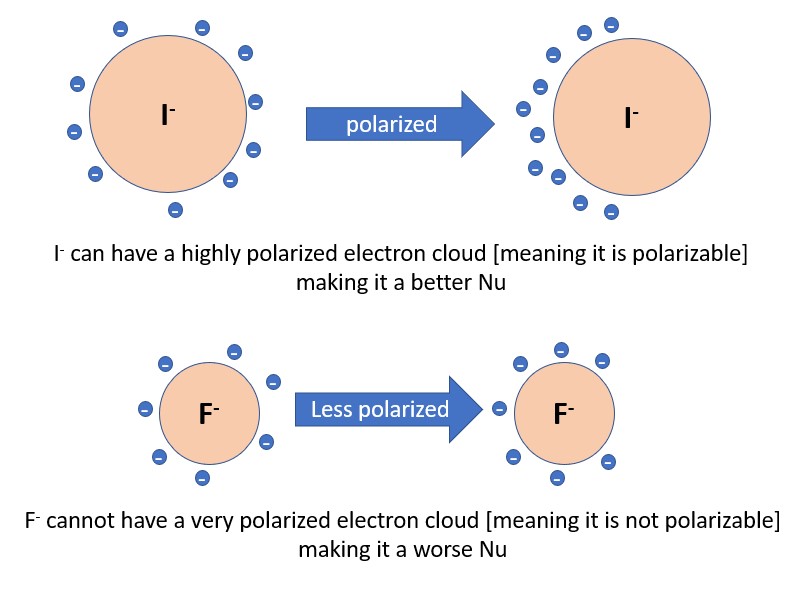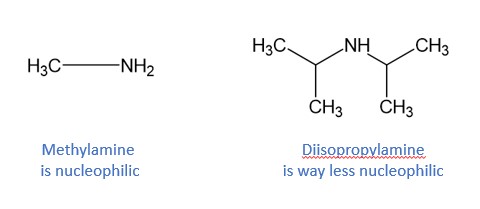Is No2 A Strong Base
What are strong nucleophiles?
Strong nucleophiles:
Stiff nucleophiles…this is why molecules react. The nucleophilic site of the nucleophile is the region of a molecule that is reactive and has the electron density.
Stiff nucleophiles are VERY important throughout organic chemistry, only will be especially important when trying to make up one's mind the products of elimination and substitution (SN1 vs SN2) reactions. In fact, there is non a more important part of an organic chemical science reaction than the nucleophile and the electrophile. So, let's expect at what makes strong nucleophiles:
There are generally iii factors to remember when discussing how nucleophilic a reactant is:
i) Size – Mostly (simply not e'er) the more linear and/or smaller the nucleophile, the more than nucleophilic it will be. This is because it can react at more sites and will not exist sterically hindered if information technology is smaller or linear. Recollect, smaller nucleophiles can fit into more than places, therefore will be able to react at more than places and will necessarily be more nucleophilic. This has a lot to practice with sterics. Yous volition hear a lot about bulky bases, which are nucleophilic but as well darn big to be a nucleophile and can only exist a base of operations.
2) Electronegativity– The more electronegative an atom is, the less nucleophilic it volition be. This is because more electronegative atoms will hold electron density closer, and therefore will be less probable to let that electron density participate in a reaction. We meet this in calculations and experiments that show nucleophilicity decreases as you lot get closer to fluorine on the periodic table (C > North > O > F).

iii) Polarizability– The more than polarizable an atom is, the more nucleophilic it will be. Polarizability is divers as the ability to distort the electron cloud of an atom, which allows it collaborate with a reaction site more than easily. More often than not, polarizability increases every bit you lot travel down a cavalcade of the periodic tabular array (I > Br > Cl > F)

Beneath is a tabular array of relative nucleophilic strength. This is relative because nucleophilic strength is also dependent on other factors in the reaction, such as solvent. I am not a huge fam of memorizing charts, but this might be a skillful ane to know pretty well.
| VERY Practiced nucleophiles | HS–, I–, RS– |
| Expert nucleophiles | Br–, HO–, RO–, CN–, N3 – |
| Fair nucleophiles | NH3, Cl–, F–, RCO2 – |
| Weak nucleophiles | HtwoO, ROH |
| VERY weak nucleophiles | RCOiiH |

As shown above, as a general rule, the anion of a reactant will be a ameliorate nucleophile than the neutral form. (i.e. RCOii – is a better nucleophile than RCO2H)
But nucleophiles are likewise bases?
Remember about information technology for a second….good nucleophiles (as shown above) can have a negative charge and will about e'er have a lone pair. Bases accept protons, with a negative charge or lonely pair. [gasp] So it makes sense in that location volition be at least some overlap between bases and nucleophiles. This is a major consideration when looking at SN vs E reactions.
Here are a couple of good rules to recall:
- Bases will not be good nucleophiles if they are really bulky or hindered. A diversity of amine bases can be bulky and not-nucleophilic.

2. Nucleophiles will not be practiced bases if they are highly polarizable. I- is the best example of this. Neat nucleophile, actually poor base.
Why do we care virtually strong nucleophiles?
Organic chemistry is all about reactions. We really need to know what is nucleophilic and what is not so that we tin determine what is going to react at the electrophilic site. If you know this, you can predict the products of organic chemistry reactions, even ones that you have non seen before.
The next footstep is to learn nearly electrophiles.
Please visit our contempo post on this topic –> Electrophilic addition. Non to humble brag, but it is pretty expert.
For more information on this and other topics of organic chemistry involvement, please visit organic chemical science

Reference: Nucleophilic forcefulness
Is No2 A Strong Base,
Source: https://www.aceorganicchem.com/blog/know-your-strong-nucleophiles/
Posted by: turnertablead.blogspot.com


0 Response to "Is No2 A Strong Base"
Post a Comment